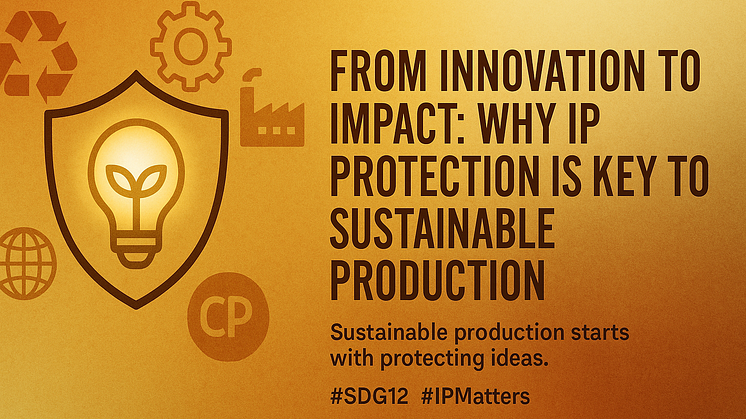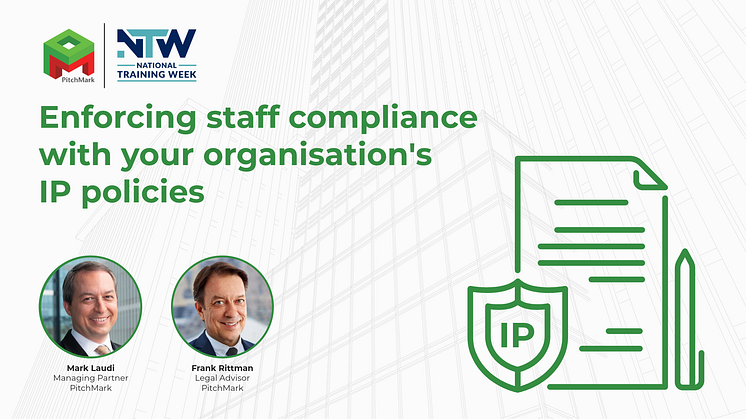
News -
From Innovation to Impact: Why IP Protection is Key to Sustainable Production
In the race to build a more sustainable world, ideas are everything. From biodegradable packaging to energy-efficient engines, it is innovation that transforms good intentions into tangible change. But innovation is not a spontaneous or risk-free process. It takes investment, commitment, and time – all of which hinge on an essential guarantee that innovators’ ideas will be protected.
This is where intellectual property (IP) rights come in. Respecting IP is fundamental to fostering sustainable production, as outlined in the United Nations Sustainable Development Agenda’s Goal 12, which emphasizes responsible consumption and production patterns. Without robust IP protection, the pipeline from concept to climate solution dries up – and with it, our hopes for a cleaner, more sustainable future.
Intellectual Property and Sustainable Development
The United Nations' 2030 Agenda for Sustainable Development was adopted by all of its member states in 2015 as a shared blueprint for peace, prosperity, and sustainability for people and the planet. At its core are 17 sustainable development goals (SDGs) which call for action to end poverty, improve health and education, reduce inequality, and spur economic growth—all while tackling climate change and preserving ecosystems. Countries pledged to align their national policies and investments with these goals, fostering partnerships across governments, civil society, and the private sector to achieve measurable progress by 2030. The agenda reflects an understanding that sustainable development requires holistic, inclusive, and forward-looking solutions—including strong protections for innovation and creative contributions.
While the SDGs are often associated with clean water, fresh air, and environmental preservation, the agenda also emphasizes the importance of building inclusive, knowledge-driven economies. A lesser-known but vital component is the link between intellectual property and sustainability: for ideas to contribute meaningfully to long-term development, they must first be protected. Without IP rights, the incentive to create, share, and invest in new solutions diminishes—undermining the very innovation needed to achieve our shared goals.
Innovation Requires Security to Flourish
Developing sustainable technologies often requires years of research and significant upfront investment. Whether it's a startup creating plant-based materials or a multinational company designing more efficient solar panels, these ventures are made possible because IP protection provides a safety net for return on investment.
Patents, trade secrets, and design rights ensure that innovators can control the use of their breakthroughs — not to stifle progress, but to fuel it. In this sense, IP protection is not a barrier, but a bridge: it creates the incentive structure necessary for entrepreneurs, researchers, and companies to push the boundaries of sustainable production.
Frank Rittman, Legal Advisor for PitchMark® LLC, emphasizes that "You can’t have sustainable production without sustainable innovation—and you can’t have sustainable innovation without IP protection. When creators’ rights are respected, it sends a signal that responsibility matters throughout the production chain."
Circular Models Depend on Proprietary Knowledge
Sustainable production doesn’t stop at creating new products — it’s about rethinking entire systems. Closed-loop supply chains, eco-design, and upcycled goods rely heavily on new models of innovation. The knowledge embedded in these processes — from proprietary materials to manufacturing techniques — is valuable intellectual capital.
For example, HP’s closed-loop recycling process for printer cartridges—developed and patented over time—has enabled the company to recover and reuse plastics from more than 100 million devices, significantly reducing raw material demand while meeting sustainability targets.
IP Enforcement Helps Combat Greenwashing
In markets saturated with "eco-friendly" claims, IP enforcement plays a crucial role in validating genuine innovation. When products developed through extensive research are replicated and sold by imitators, market integrity is compromised. This erosion of trust makes it challenging for legitimate innovators to compete.
A notable example is the fast fashion industry, where brands like Shein have faced numerous lawsuits for allegedly copying designs from independent eco-conscious designers without authorization. Such practices not only undermine the original creators but also blur the lines between authentic and superficial sustainability claims.
For Procurement Officers, conducting supplier audits that include IP sourcing checks is essential to mitigate reputational risks and align with SDG 12 objectives.
IP Enables Collaboration for Sustainable Development
Innovation doesn’t always occur in isolation. Universities, NGOs, startups, and corporations often work together on sustainability challenges. IP frameworks provide the structure that allow such partnerships to flourish by clarifying ownership, licensing terms, and commercialization pathways.
For example, clean energy technologies developed through public-private partnerships can be widely adopted if IP rights are properly managed and shared. In this way, respecting IP fosters a culture of collaboration without compromising the rights of those who originated the innovation.
A Sustainable Production Agenda with IP at Its Core
Sustainable production transcends output—it encompasses the processes behind innovation. Respecting intellectual property ensures that these processes are fair, rewarded, and scalable. For companies aiming to future-proof their operations, integrating IP protection into sustainability strategies is crucial for operational resilience.
Procurement, Sustainability, and HR leaders play pivotal roles by embedding IP respect into sourcing policies, product development pipelines, and employee training programs.
From conception to market, from idea to impact—sustainability begins with protecting the ingenuity that makes it possible.
PitchMark trains clients to respect vendors’ intellectual property and build lasting trust, leading the way in responsible procurement. Get PitchMark certified to position your brand as a leader in ethical sourcing and innovation. Visit PitchMark.net and register as a PitchMark client today.

